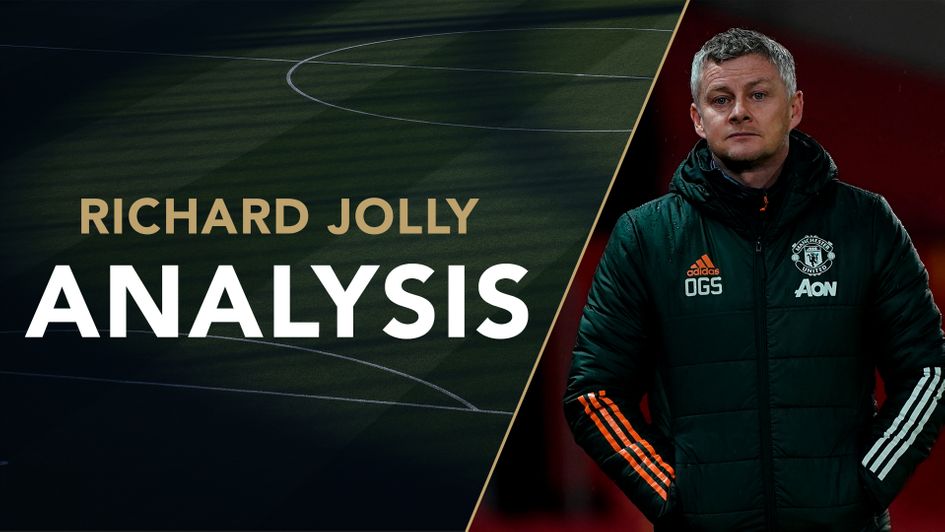There were three goals in the opening seven minutes, seven in the first 79.
Manchester United’s first supposed battle of superpowers this season was spectacular. They lost 6-1 to Tottenham. And since Harry Kane’s penalty at Old Trafford in October, they have played 551 minutes of football in Premier League big-six matches. Those 551 minutes have produced one goal, and United did not score that: it was Pierre-Emerick Aubameyang’s spot-kick winner for Arsenal.
Understandably, United prop up the big-six mini-league (and in a campaign when Leicester, West Ham, Everton and Aston Villa are often above some of them, it is never been a top-six table). Their five points have come from five 0-0 draws. Ole Gunnar Solskjaer spent much of his first 18 months in charge beating the best; now he often cancels them out.
Goal shortage in games between the big six
United are an extreme case, but they contribute to a broader trend. The goals have dried up in the season-defining games. The drought is not confined to them. Arsenal have scored five goals in their seven big-six games this season. Chelsea got four in their first eight. Tottenham’s total of 12 looks healthy, but remove their win at Old Trafford and they only have six in the remaining seven matches, and just two in the last four.
United have been responsible for five stalemates but Chelsea also drew 0-0 with Tottenham. Since Spurs’ 6-1 triumph at Old Trafford, there has arguably only been one spectacular scoreline: Liverpool 1 Manchester City 4.
The result is that there have been just 47 goals in 23 big-six meetings, an average of only 2.04. That is down almost a goal a game from last season, where big-six meetings averaged 3.03 goals and where even the lowest scorers, Arsenal and Spurs, registered 1.2 per game. United got 19 in their 10: to equal that tally this season, they would have to score six each against City, Liverpool and Tottenham.
Despite conceding six to Spurs, United have still let in fewer in big-six matches than anyone other than City. It does not automatically render United a boring team; their first 19 games against the rest averaged 3.85 goals.
Some scorelines have been deceptive
But if it speaks to the caution some have shown in major matches, the scorelines may still have been deceptive. United’s five 0-0s produced 32 shots on target; in contrast, their two home matches against Leeds and Southampton yielded 33 attempts on target, but 17 goals. United’s games this season average about nine shots on target; in those series of scoreless draws, it was 6.4; in their big-six games in all, it is 6.57.
Some stalemates were less stale than perhaps it seemed. United’s five 0-0s had a combined xG of 9.0; their share of that was 4.30. Some golden chances have been missed: Edinson Cavani had two at Arsenal with a combined expected goals value of 1.07, Bruno Fernandes and Paul Pogba one each at Anfield that added up to 0.87. Manchester City had three opportunities at Old Trafford with a total xG of 1.04. These were not speculative long-range efforts.
If United feel statistical outliers, City look nearer the new norm.
City have been dominant against the big six
These matches reflect their campaign. They only claimed 13 points in 10 big-six games last season; now they have 17 in eight. Their big-six games last year produced 3.1 goals per game and they conceded 1.3. Now that is down to 2.25, with Pep Guardiola’s team letting in just 0.63. Their improvement this season has been based on defence and only two of those five goals have been scored when John Stones and Ruben Dias have been paired.
City have only allowed 19 shots on target in those eight matches. Their xGA is 6.0. If United’s low-scoring games reflect poor finishing and fine goalkeeping, City’s defensive efforts mean that Ederson has not often had to excel.
At the same time, City have displayed an ability to create. They have an expected goals total of 17.2 in those eight games, far exceeding their actual tally of 13 goals (two missed penalties is one reason, while Jorginho’s two misses for Chelsea have also brought down the total in big-six encounters). Their highest expected goals in any Premier League match this season came at Anfield: 3.55. Their fourth best was at Stamford Bridge: 3.18.
Their xG difference of +11.2 shows a statistical domination of such matches and it is getting bigger. They have ‘won’ on xG in all eight matches by at least 0.39 – they posted an xG of 1.76 to Tottenham’s 0.66 when Jose Mourinho’s team prevailed 2-0 in November – and, in the last four, the difference has been at least 1.76.
If United’s lone goal in big-six matches remains Bruno Fernandes’ early penalty against Spurs, Ilkay Gundogan is the joint top scorer in the mini-league alongside Heung-Min Son, on five. Sunday’s Manchester derby could pit City’s form against United’s propensity to draw 0-0. Their December draw had just four efforts on target: the joint fewest in any City and any United league game this season. In a sense, that has been both the outlier and the norm in a campaign where the most eagerly-anticipated games have brought the fewest goals. But Sunday pits Guardiola’s winning habit against Solskjaer’s stalemate specialists.
